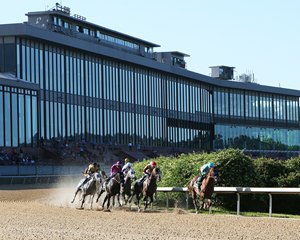Charlatan's Arkansas Derby Test Results Under Review


Charlatan, a winner of the first of two divisions of the May 2 Arkansas Derby (G1) at Oaklawn Park, did not pass initial post-race testing and is having a split sample reviewed, an individual with knowledge of the situation told BloodHorse May 26.
Bernie Hettel, state steward at Oaklawn, confirmed Tuesday that two horses that raced May 2 did not clear testing but, citing confidentiality, said he was unable to currently provide horse names or their connections. Horsemen have the right to call for split sample testing to see whether or not it confirms the initial sample test. Stewards and regulators make no decisions before receiving the results of the split sample testing.
Based on an unnamed source, the Louisville Courier-Journal reported Tuesday that two failed tests were from horses trained by Bob Baffert, including one of his top 3-year-olds. Baffert conditions Charlatan, and also won the second division of the Arkansas Derby with Nadal. He took an allowance race that day with Gamine as well. Those were the only three horses he raced at Oaklawn May 2.
Baffert issued a statement midafternoon Tuesday, which was acquired by BloodHorse.
"The rules of the Arkansas Racing Commission mandate confidentiality concerning any investigation into an alleged rule violation until there is a written decision by the stewards," the Hall of Fame trainer stated. "I am extremely disappointed that, in this instance, the Commission has not followed its own rules for confidentiality. I am hoping for an expedited investigation and look forward to being able to speak soon about any written decision of the stewards, if and when it becomes necessary and I'm allowed to under the Commission's confidentiality rules."
Charlatan earned $300,000 for his victory in a division of the Arkansas Derby, in which he defeated Basin by six lengths. The son of Speightstown is perfect in three starts and considered one of the favorites for the Kentucky Derby Presented by Woodford Reserve (G1). He races for the partnership of SF Racing, Madaket Stables, Starlight Racing, Stonestreet Stables, Fred Hertrich III, John Fielding, and Golconda Stables.
A split sample is typically requested when a horse tests positive for a prohibited substance, usually on findings that could result in a disqualification and/or loss of purse, or cause a suspension or fine for a trainer. The split sample provides the affected party due process and a means to potentially dispute findings if it is inconsistent with the initial lab findings.
A two-time Triple Crown winner, first with American Pharoah in 2015 and then with Justify in 2018, Baffert came under scrutiny last September when it was revealed in the New York Times that Justify was found to have a prohibited level of scopolamine in his system after he won the 2018 Santa Anita Derby (G1) at Santa Anita Park in April 2018. No action was taken against the trainer or toward the purse, with the California Horse Racing Board never calling a positive because it attributed the lab's finding for scopolamine as environmental contamination tied to jimsonweed based on the expertise of its equine medical director Dr. Rick Arthur.
The scopolamine results were not confirmed by the CHRB until the New York Times article, more than 17 months after the Santa Anita Derby.

Hettel said a split-sample test can be returned as soon as five days, though COVID-19 conditions across the country have closed some state laboratories and could slow the process. If the new laboratory split sample disputes the findings of the first, there is rarely any means for the case to go forward. Confirmation, on the other hand, leads to stewards investigating the matter.
"Then we'd have a hearing, testimony, get lab reports, veterinary reports, people-involved reports, take testimony, and the stewards contemplate it and issue a ruling. That's a long way off," Hettel said.
If Charlatan is ultimately disqualified, it could have implications that go beyond the purse of the race, which would need to be redistributed. Winning a grade 1 is of importance for a colt's stud career, and qualifying points toward the Kentucky Derby are awarded to the official winners.
Earlier this month shortly after the two divisions of the Arkansas Derby, Hill 'n' Dale Farms secured the breeding rights to Charlatan.
A points system is used by Churchill Downs to determine preference when more than the capacity field size of 20 horses are entered in the Derby, a common occurrence. The Derby this year is Sept. 5. Nadal and Charlatan are first and fourth, respectively, on the Kentucky Derby leaderboard with 150 and 100 points, having earned 100 points apiece in their Arkansas Derby divisions. Both horses are tentatively scheduled to run in the June 20 Belmont Stakes (G1) at Belmont Park.
Purse earnings used to determine the field for the June 20 Belmont Stakes (G1) also could be impacted. If a disqualification were to occur, that decision could be appealed.
According to the condition book, if the Belmont field is oversubscribed the field will be determined by giving the first eight starters preference based on highest earnings in graded stakes at one mile or longer. The next five would be based on accumulation of highest lifetime earnings in all non-restricted stakes. The remaining three starters in the field limited to 16 would be selected by the Belmont Stakes Selection Committee.
At this early juncture there are nine probable starters for the 1 1/8-mile Belmont Stakes, according to the New York Racing Association press office.
